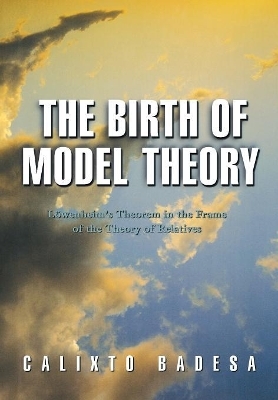
The Birth of Model Theory
Princeton University Press (Verlag)
978-0-691-05853-5 (ISBN)
Lowenheim's theorem reflects a critical point in the history of mathematical logic, for it marks the birth of model theory--that is, the part of logic that concerns the relationship between formal theories and their models. However, while the original proofs of other, comparably significant theorems are well understood, this is not the case with Lowenheim's theorem. For example, the very result that scholars attribute to Lowenheim today is not the one that Skolem--a logician raised in the algebraic tradition, like Lowenheim--appears to have attributed to him. In The Birth of Model Theory, Calixto Badesa provides both the first sustained, book-length analysis of Lowenheim's proof and a detailed description of the theoretical framework--and, in particular, of the algebraic tradition--that made the theorem possible. Badesa's three main conclusions amount to a completely new interpretation of the proof, one that sharply contradicts the core of modern scholarship on the topic.
First, Lowenheim did not use an infinitary language to prove his theorem; second, the functional interpretation of Lowenheim's normal form is anachronistic, and inappropriate for reconstructing the proof; and third, Lowenheim did not aim to prove the theorem's weakest version but the stronger version Skolem attributed to him. This book will be of considerable interest to historians of logic, logicians, philosophers of logic, and philosophers of mathematics.
Calixto Badesa is Associate Professor of Logic and History of Logic at the University of Barcelona.
Preface ix Chapter 1. Algebra of Classes and Propositional Calculus 1 1.1 Boole 1 1.2 Jevons 10 1.3 Peirce 12 1.4 Schroder 17 Chapter 2. The Theory of Relatives 31 2.1 Introduction 31 2.2 Basic concepts of the theory of relatives 33 2.3 Basic postulates of the theory of relatives 40 2.4 Theory of relatives and model theory 51 2.5 First-order logic of relatives 66 Chapter 3. Changing the Order of Quantifiers 73 3.1 Schroder's proposal 73 3.2 Lowenheim's approach 81 3.3 The problem of expansions 87 3.4 Skolem functions 94 Chapter 4. The Lowenheim Normal Form 107 4.1 The Lowenheim normal form of an equation 107 4.2 Comments on Lowenheim's method 113 4.3 Conclusions 122 Chapter 5. Preliminaries to Lowenheim's Theorem 129 5.1 Indices and elements 129 5.2 Types of indices 132 5.3 Assignments 135 5.4 Types of equations 138 Chapter 6. Lowenheim's Theorem 143 6.1 The problem 143 6.2 An analysis of Lowenheim's proof 148 6.3 Reconstructing the proof 191 Appendix. First-Order Logic with Fleeing Indices 207 A.1 Introduction 207 A.2 Syntax 207 A.3 Semantics 211 A.4 The Lowenheim normal form 217 A.5 Lowenheim's theorem 220 References 227 Index 237
| Erscheint lt. Verlag | 25.1.2004 |
|---|---|
| Verlagsort | New Jersey |
| Sprache | englisch |
| Maße | 152 x 235 mm |
| Gewicht | 510 g |
| Themenwelt | Geisteswissenschaften ► Philosophie ► Logik |
| Mathematik / Informatik ► Mathematik ► Logik / Mengenlehre | |
| ISBN-10 | 0-691-05853-9 / 0691058539 |
| ISBN-13 | 978-0-691-05853-5 / 9780691058535 |
| Zustand | Neuware |
| Haben Sie eine Frage zum Produkt? |
aus dem Bereich


